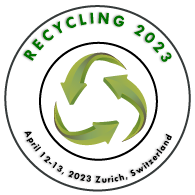WASTE WATER TREATMENT
Wastewater treatment is the process of removing impurities from wastewater and converting it into effluent that may be recycled back into the water cycle. Once returned to the water cycle, the effluent has a low environmental impact or can be reused for a variety of uses (called water reclamation). A wastewater treatment plant is where the treatment takes place. Various types of wastewater are treated at wastewater treatment plants of the proper type. The treatment plant for domestic wastewater (also known as municipal wastewater or sewage) is known as a sewage treatment plant. The treatment of industrial wastewater takes occur in either a separate industrial wastewater treatment plant or a sewage treatment facility (usually after some form of pre-treatment).Agricultural wastewater treatment facilities and leachate treatment plants are two more types of wastewater treatment plants.
Related Conference of WASTE WATER TREATMENT
WASTE WATER TREATMENT Conference Speakers
Recommended Sessions
- ADVANCED RECYCLING: PHYSICAL & CHEMICAL
- BIO- ELECTROCHEMICAL TREATMENT SYSTEM
- BIO-PLASTICS
- BIOREMEDIATION
- CHALLENGES IN COLLECTION & SEGREGATION OF PLASTICS WASTE
- CHEMICAL WASTE RECYCLING
- CIRCULAR ECONOMY FOR ELECTRIC VEHICLES (EV) BATTERIES
- CIRCULAR PLASTICS FOR PACKAGING
- E-WASTE
- FOOD AND AGRICULTURAL WASTE RECYCLING
- INDUSTRIAL WASTE RECYCLING
- METAL RECYCLING
- PAPER RECYCLING
- PLASTICS RECYCLING: CHALLENGES AND OPPORTUNITIES
- SOLID WASTE MANAGEMENT
- TECHNOLOGY & INNOVATION IN PLASTICS RECYCLING
- THERMAL WASTE RECOVERY
- WASTE RECYCLING AND MANAGEMENT
- WASTE WATER TREATMENT

